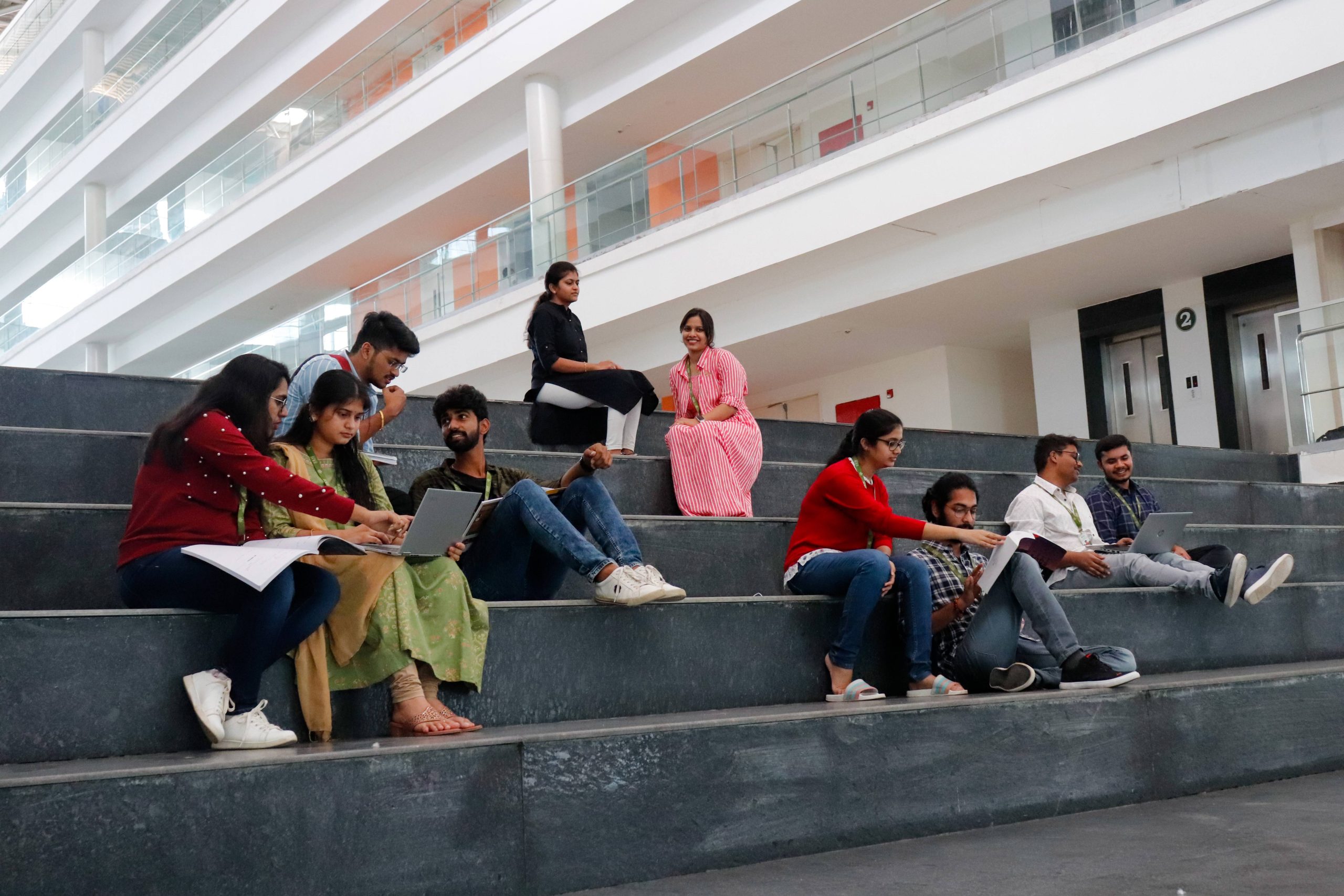Liberal arts in the ever-evolving dynamics of education in India
“In a properly automated and educated world, then, machines may prove to be the true humanizing influence. It may be that machines will do the work that makes life possible and that human beings will do all the other things that make life pleasant and worthwhile.”
― Isaac Asimov
 The urge to get exposed to a more diversified learning approach is understandable. Choosing a major that can help develop essential life skills while gaining a broader world perspective can be a great stride in your career. Liberal arts have always been an underrated field of study with numerous unexplored scopes. However, there is a shift in the air since the increasingly evolving world demands the production of skilled professionals with a knack for critical thinking. The trend is gradually spreading in the Indian educational scenario too.
The urge to get exposed to a more diversified learning approach is understandable. Choosing a major that can help develop essential life skills while gaining a broader world perspective can be a great stride in your career. Liberal arts have always been an underrated field of study with numerous unexplored scopes. However, there is a shift in the air since the increasingly evolving world demands the production of skilled professionals with a knack for critical thinking. The trend is gradually spreading in the Indian educational scenario too.
India’s National Education Policy 2020 holds a greater emphasis on Liberal arts education. It envisions the holistic development of individuals through multidisciplinary, interdisciplinary, and transdisciplinary learning approaches. It insists on the need for higher education institutes to become multidisciplinary by 2040. De-compartmentalising the educational sector by breaking the rigid barrier between professional and liberal education is one of its major agendas. Educational structures in India are thus getting more flexible while contemplating the future of Liberal arts education. The rapidly changing employment landscape and the forthcoming industrial revolution clearly imply the extreme relevance of Liberal arts education. This calls the world’s attention towards the broader aspects of the stream of Liberal arts.
The stream of Liberal arts
The term liberal arts have roots in the classical Greek concept of a diversified education that focuses on the intellectual cultivation of the mind. The education of the Greeks in those days included different areas ranging from grammar to geometry and music. Liberal arts in the present day offer a wide range of majors and minors. These options fall into the more significant categories of humanities, social sciences, and natural sciences. Liberal arts education evokes the ability to analyse socio-political, economic, and environmental problems while being contemplative and creative. These abilities are highly relevant in current social circumstances, especially in India.
Liberal arts in the era of uncertainties
In an age that keeps updating itself, the fear of getting outdated is real. Living in a world constantly exposed to digitization, outsourcing, automating, etc., will demand fierce competence from the jobseekers. What matters is not what you learned over the years but how you learned all those things. The chances of the things you learned getting outdated are higher, but not how you perceived that knowledge.
Liberal arts as a learning subject becomes highly relevant in this scenario. Students from a liberal arts background will have much more to contribute to the ever-advancing society than the students from other streams. Liberal arts nurture the abilities of problem-solving and critical thinking. It trains the learner to think out of the box and develop original solutions.
Why Liberal arts
Liberal arts majors have the privilege of entering varying career paths due to the holistic approach the learning process holds. The possibilities are never limited. The discipline of liberal arts targets to provide a general idea regarding the subject matter and trains to think critically. The skills they earn are not restricted to a specific technical profession. Writing, critical thinking, and research skills are continuously refined through exposure to various subject matters. The job market offers opportunities for liberal arts students in science, technology, engineering, business, and many other fields. Every mainstream working ecosystem will require the input of a liberal arts major.
Advantages of pursuing a liberal arts course
Democratised educational process
Modern liberal arts education is armed with a curriculum that promotes breadth as well as the depth of knowledge. The curriculum is sufficiently flexible and gives prominence to the student’s choice. They get to play a significant role in shaping their program. This facilitates the democratisation of the educational process.
Diverse disciplines and broader perspectives
Liberal arts education provides exposure to diverse disciplines of study, which makes the learner capable of gaining a broader perspective of the field they prefer. A positive mindset, readiness to look at the world with enthusiasm, and innovative learning strategies will benefit any organization.
Thinking capacity and expanded worldview
Obtaining knowledge will help the learner gain skills in a particular area, but it also helps develop thinking capacity. Liberal arts education makes sure to guard the learners with an ability to understand and widen their knowledge limits. It nurtures the enthusiasm of the learner. This, in turn, helps to adjust the lens with which they view the world around them.
Different thinking processes
Liberal arts education lets you understand the importance of different thinking processes in every learning environment. Be it creative, analytical, or critical, a Liberal arts major knows when and how to assert these thinking processes. Challenging the preconceived notions and showing the courage not to follow the crowd is a remarkable impact liberal arts education has on the learner. This is a much-needed quality an individual should aspire to master.
Flexibility
A liberal arts student knows how to build skills based on the broader foundational knowledge. Thus, they are very flexible in acquiring new knowledge and establishing needed skills. This will help them not settle down for one specific job for an entire lifetime.
Soft skills
Every industry needs individuals with skills that are in high demand. Some of them are effective communication, critical thinking, problem-solving, and leadership qualities. Liberal arts education prepares the students to attain these qualities.
Socially responsible learner
Liberal arts don’t focus on a specialised subject. It gives a vast knowledge and allows the learner to develop creative paths to resolve social challenges exposed to them.
Opportunity to explore and experiment
Innovative ideas, concepts, and unique experiences are always there in the vicinity of the learner. The advantages of community-based learning and peer-reviewed research are accessible to the learner. This allows them to explore and experiment with the knowledge they have.
Lifelong learning
Processing the information and thinking analytically will guide the learner to think across the disciplines. This will remain a crucial life skill that could be helpful in a variety of circumstances.
Scope of liberal arts in India
 The dynamics of education is an ever-evolving process. New learning methods and diverse professions will keep popping up from time to time. With the remarkable shift that happened in the field of education, a door to a diverse set of specialized career options has opened. Not to deny the requirement for skilled professionals in the age-old job market, but the jobs will be more reasoning-oriented in the future, favoring liberal arts education. Professionals should be able to analyse the present scenario and make decisions for future changes. They should be able to think critically and be ready to absorb the constantly changing knowledge environment. This indicates the demand for liberal arts majors in the future.
The dynamics of education is an ever-evolving process. New learning methods and diverse professions will keep popping up from time to time. With the remarkable shift that happened in the field of education, a door to a diverse set of specialized career options has opened. Not to deny the requirement for skilled professionals in the age-old job market, but the jobs will be more reasoning-oriented in the future, favoring liberal arts education. Professionals should be able to analyse the present scenario and make decisions for future changes. They should be able to think critically and be ready to absorb the constantly changing knowledge environment. This indicates the demand for liberal arts majors in the future.
Liberal arts is an interdisciplinary model of education preferred by many youngsters worldwide. Introducing the student community to the perks of liberal arts education can do wonders in a developing country like India. The advantages of opening multiple career options for the country’s youth are immaculate. Also, including and enhancing liberal arts in the mainstream education sector will help improve the global ranking of Indian educational institutions.
The advancing job market demands competitive advantages from individuals. They are looking for someone more human and connected. Along with passion and energy, they also need their employees to be flexible during changes and see things as they are.
The pace, scope, and strategies of this generation are entirely different from that of the previous one. Drastic changes in climate, artificial intelligence, way of approach, etc., will demand more extraordinary resourcefulness to sustain the updating. The diverse economy of India will make sure that the students interact with different individuals irrespective of gender, religion, class, etc. This will enhance their development as valuable employees, citizens, and, most importantly, human beings.
A liberal arts degree prepares one to withstand the uncertainties of a career. It can cope with the test of time since there are no expiry dates for critical thinking and problem-solving. Polished proficiency in writing, speaking, presenting, and collaborating is another trademark of liberal arts education. It is immensely helpful if viewed from the perspective of a job aspirant.
Enhanced cultural understanding is another valuable reward from liberal arts. Interdisciplinary studies play a significant role in building this broader understanding. The importance of cultural anthropology and international relations is relatively higher, especially in India. The list of career options emerging from liberal arts includes law, politics, social work, psychology, public relations, journalism, Civil services, and many more. These job sectors are considerable investments in the development of the country.
The ability to find out opportunities and take unexpected directions will be beneficial irrespective of the interests of your comfort zones. Arming the students with flexibility and imagination will prepare them to be confident in the continuously updating job markets. In an era where the information and options are available at your fingertips, it is your perspective that makes the difference.
Selecting a career that will not disappoint you is a hectic task in every individual’s life. Especially when you don’t really want to focus on one specific field of study. If you are interested in multiple subjects and ready to get exposed to a diverse study environment, Liberal arts is your answer. If you are willing to invest yourself in a more diversified approach to learning, attending a Liberal arts institution like SRM University AP might be the right choice.
Liberal arts at SRM AP
The Liberal arts education at SRM University AP provides an opportunity to pursue an interdisciplinary program across Humanities, Social Sciences, Commerce, Business Studies, and Physical sciences. Complex and increasing challenges are a part of this generation, and we are destined to face them. Multi-dimensional thought processes and problem-solving skills are the demanding qualities of an individual in a world of constant changes. A holistic education will help students to develop these necessary skills.
SRM AP has a School of Liberal Arts and Social Sciences (SLASS), allowing students to choose courses across the disciplines. The school is comprised of six departments, namely English, History, Psychology, Economics, Commerce, and Liberal arts. The Bachelor’s degree curriculum is broadly divided into Foundation courses and Majors. Students can choose their minor from a variety of subjects across the disciplines. This will help them to expand their knowledge beyond their subject of specialisation.
SRM University AP has faculties from all over India and across the world. SLASS at SRM AP offers a high-quality library that has the facilities of books or journals in print and electronic, extra-mural lectures, and colloquiums by academicians and eminent scholars. The diversity of available courses provides an unrestricted learning environment that is supported by the facilities provided by the university.
Advantages SLASS
Multidisciplinary learning ecosystem
Students are free to choose courses from diverse disciplines along with their major and foundational course.
Liberal arts; employer’s choice
The latest employment surveys state that multinational employers prefer aspirants with liberal arts degrees for their wide range of skills and ability to adapt to changes.
Learn from world-class faculties
75% of the faculty at SRM University AP holds international academic exposure or are from foreign universities, and 15% are foreign nationals.
International career opportunities
The global recognition of the courses grants a plethora of opportunities at international and postgraduation levels.
Liberal arts education will train you to learn things outside the textbook, making you confident enough to stand confidently in the face of change. In a world where machines overtake all the works of human beings, there should be more humans to look at life and think accordingly to provide much-needed responses.
- Published in Blog, Liberal Arts
Unlock a World of Diverse Career Opportunities with BA in Liberal Arts
Thinking Beyond Boundaries: Unravel Your Potential with a BA in Liberal Arts
In today’s rapidly evolving world, selecting the right path for your education can be extremely daunting. The pressure to choose a specialised degree prevails, but have you ever thought if there is another way? The Bachelor of Arts in Liberal Arts proffers an idiosyncratic and revolutionary journey, furnishing students with dynamic skill sets transcending boundaries and unlocking a world of many conventional and unconventional career opportunities.

BA in Liberal Arts promotes critical thinking and nurtures intellectual curiosity. It empowers and encourages candidates to explore multitudes of disciplines, from literature and philosophy to economics and political science. The multidisciplinary approach encourages students to witness the interrelation of the world we inhabit, to commune with different perspectives and, of course, to find advanced solutions to intricate problems.
Flexibility is the hallmark of a degree in Liberal Arts. Candidates have the right and freedom to personalise their education to meet their interests and career goals. By amalgamating BA in Liberal Arts subjects such as Sociology and History or Philosophy and Fine Arts, individuals can come up with an unique blend of expertise that sets them apart in the competitive job market.
There is no denying that employers in the current scenario seek well-versed individuals who can adapt and handle dynamic challenges, making liberal arts graduates highly sought after.
Further, a BA in Liberal Arts polishes essential soft skills that employers seek. Effective communication, teamwork, adaptability, and creativity are ameliorated via this degree programme. Graduates are well-equipped to navigate a rapidly changing job market and lead with the utmost confidence in a world demanding advancement and originality. Hence, if you have a keen interest in Literature and Arts, pursuing BA Liberal Arts would be the best fit.
In the present era, lots of individuals are still perplexed between a Bachelor of Liberal Arts and a Bachelor of Arts. So, let’s take a dig into it.
Bachelor of Liberal Arts Vs Bachelor of Arts
The difference between a Bachelor of Liberal Arts (BLA) and a Bachelor of Arts (BA) degree lies essential in their focus and curriculum. However, both degrees are typically rooted in the philosophy of liberal arts; they offer vivid approaches and opportunities to candidates.
Let’s quickly comprehend the difference between BLA and BA.
Bachelor of Liberal Arts (BLA)
The BLA is typically a multidisciplinary degree allowing students to tailor their own course by merging different subjects from many different domains. It motivates students to dive deep into diverse areas of knowledge and promotes problem-solving skills, critical thinking, as well as creativity.
Bachelor of Arts (BA)
On the other hand, the BA is much more conventional, proffering a wider education in the liberal arts and sciences. It generally incorporates core requirements in subjects such as Literature, History, Social Sciences, Natural Sciences, and Mathematics, giving students a well-structured education.
The BLA offers a more personalised and multidisciplinary approach, whilst the BA gives a balanced and all-inclusive education in the liberal arts and sciences. Deciding between the two solely depends on your career goals, interests, and preferred way of learning.
Career Opportunities After BA in Liberal Arts
Once completing BA Liberal Arts, graduates have a versatile skill set that can open doors to a plethora of opportunities in numerous sectors. Below are some potential job opportunities for liberal arts graduates:
- Communications Specialist
- Content Writer
- Research Assistant
- Human Resources Assistant
- Public Relations Coordinator
- Social Media Manager
- Event Coordinator
These are just a couple of examples, and the possibilities and opportunities are massive. Liberal arts graduates possess the flexibility to adapt and excel in diverse job roles across industries, making them valuable assets in today’s dynamic and ever-changing job market.
However, a key aspect that mustn’t be ignored while taking up BA Liberal Arts is- choosing the right institution or university. Cut to the quick, one of the best universities offering a BA in Liberal Arts is SRM University-AP.
Unleash Your Creative Mind with BA in Liberal Arts Programme at SRM University-AP
The BA in Liberal Arts programme at SRM University-AP stands out from conventional degree programmes, as it empowers and encourages students to think beyond a specific discipline. By combining BA Liberal Arts subjects like Literature, History, Philosophy, Sociology, Fine Arts, and more, students gain a better understanding of the world and its intricacies.
With the supervision of proficient faculty members, candidates are exposed to a lively academic environment promoting innovation as well as independent thought. BA Liberal Arts course equips them not only with analytical but communication skills required to thrive in an ever-evolving global landscape.
At SRM University-AP, the focus is not just on books and evaluations but on experiential learning via interactive workshops, internships, and community projects, candidates implement their knowledge in real-world scenarios, making learning an engaging and practical experience.
Additionally, the University’s high-tech infrastructure and dynamic student community make sure to provide students with enriching campus life. Also, cultural events, clubs, and sports activities complement the academic curriculum, allowing students to build holistically.
In a Nutshell
BA Liberal Arts is not just a degree but an enlightening journey of self-discovery and empowerment. Commencing the liberal arts path enables candidates to unleash their potential, transcend conventional boundaries, and embrace the richness of a dynamic, interlinked world. So, if you want to have a transformative education preparing you for a lifetime of learning, growth, and impactful contributions, pursuing BA in Liberal Arts from SRM University-AP is your key to success
- Published in Blog, Liberal Arts
Explore the World of Literature and Language with a BA degree in English
Unlock Your Literary Potential with a BA in English
The BA in English programme is a gateway to a world where ideas take flight, words come alive, and stories resonate through time. If you have a love for literature, a passion for language, and an aspiration to understand the power of communication, a BA in English Honours is a fulfilling academic journey to embark upon.
From exploring literary masterpieces to honing critical and creative thinking, and analytical skills, the BA in English course provides a well-rounded education that nurtures creativity, cultural comprehension, and effective communication. This article will provide you with comprehensive BA English course details, imparting insights into its curriculum highlights and career opportunities.

Whether you aspire to become an educator or writer or pursue a plethora of other professional paths, this article will serve as a valuable guide to unravel the richness and possibilities that a BA in English programme offers.
What Are the Subjects Included in the BA English Course Curriculum?
With a curriculum incorporating a wide range of subjects in BA in English Honours, from English literature to world literature and creative writing, individuals will develop a deep treasure for the written word and acquire a distinct understanding of human expression.
Some of the common BA English course subjects and themes that are typically covered in the programme curriculum include the following:
- English Literature
- Language and Linguistics
- Literary Criticism and Theory
- World Literature
- Creative Writing
- Communication Skills
- Research Methodology
- Literary History and Periods
- Academic Writing
- Public Speaking
- Psychology of Mythology
- Neuro Linguistic Programming
- Project Based Learning
What is the Scope of a BA in English?
The scope of a BA in English is immense and offers innumerable career opportunities in multiple fields. The programme equips individuals with invaluable transferable skills, including effective communication, critical analysis, research proficiency, and the ability to forge compelling arguments. These skills are highly coveted in diverse areas, including publishing, journalism, marketing, education, and beyond.
Therefore, the scope of a BA in English course is wide-ranging, empowering graduates with a solid grounding of skills. Here are some of the high-paying areas for graduates with a BA degree in English:
- Publishing and Editing
- Writing and Content Creation
- Education
- Journalism and Media
- Public Relations and Advertising
- Content Management and Digital Marketing
- Civil Services and Competitive Exams
Transform Your Passion for Literature into a Lucrative Career with a BA in English Honours at SRM University-AP
The BA in English Honours programme offered at SRM University-AP, strives to help an individual in attaining the ability to perform in a number of contexts ranging from professional, academic, or social (in a given situation) to both communicative with the vital ability to critically think and persuade. The BA in English Hons programme at SRM University-AP will assist its students in further pursuing research areas of their interest while remaining flexible towards all the other areas of expertise.
Students who seek to undertake rigorous instruction in English can be admitted to the English Honours programme. The enrolled students in the English Honours programme will get the opportunity to take five additional Elective Courses imparted by the Department of Literature and Languages at SRM University-AP over the course of three years. This additional instruction of the programme will begin in their second semester and end in their final semester.
Moreover, at the end of the BA in English Honours programme, the student of SRM University-AP will have to undergo an additional 20 Credits in English language and literature and will be allowed to speak with authority on essential topics related to English.
Integrated Learning and Interdisciplinary Research
The department offers a more comprehensive integrated learning experience. Research is an integral part of the undergraduate programme and envisions the holistic development of students through multi-disciplinary, interdisciplinary, and transdisciplinary learning approaches. It is a space for interdisciplinary research, thought and pedagogy.
Interdisciplinarity refers to an active and productive exchange between the various science and humanities disciplines within the School of Liberal Arts and Social Sciences at the university. It facilitates engagement and conversation across the social and natural science divide. Intellectual resources are drawn across the schools of the university, identifying convergences and research themes where both can symbiotically benefit.
The department fosters interdisciplinary foundations and research through participatory, experiential, discursive and student-centric learning practices. The curriculum is research-oriented, dynamic, and flexible, which enables students to choose courses and minors from other Disciplines/ Schools in the University.
To Wind Up
BA in English is not just a degree but an entranceway to a world of never-ending possibilities. It fosters a deep understanding of language, literature, and critical thinking, providing graduates with a versatile skill set for a diverse range of career paths. From writing and publishing to education and media, a BA in English Hons degree opens doors to an enriching professional journey and creates a significant impact in the fields where words are a powerful tool.
Experience the magic of learning where literature is a skill, language, a science and the Pedagogy, an art!
- Published in Blog, Liberal Arts
- 1
- 2

